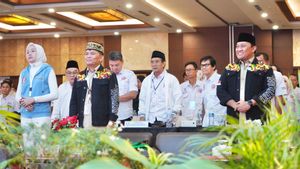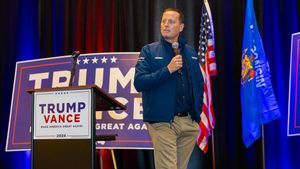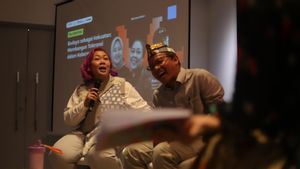JAKARTA - An anonymous account called The Pact appeared on Instagram and shared some content related to how an artist makes money.
“How does an artist make money? Tours, television appearances, greetings, merchandise, brand partners / endorsements / sponsors, performance fees, personal appearances, PPL (appearance rights), masters… and publishing. "
“How do lyricists make money? Publishing. But often lyric writers are asked to submit publishing to artists who don't contribute to the composition section. It's time for a change. #ThePact. "
Two days later, The Pact account uploaded a photo of how a lyricist and musicians earn income on Spotify. For 10 million total streams, the lyricist or composer only gets 2 thousand US dollars or 29 million rupiah.
Meanwhile, musicians who sing the song can get 13 times as much from the same song. Again, they highlighted a phenomenon in which lyricists were often asked to submit writing credits.
There are many requests to submit their lyrics because the song has the potential to become a hit if sung by a well-known singer. However, it is not uncommon for this to only harm one party, namely the lyricist.
It is known, after The Pact account popped up, a group of famous composers made an open letter to stop artists asking for credit for songs they did not write. The open letter was signed by a number of well-known composers such as Victoria Monet, Justin Tranter, Emily Warren, and others.
ComposerThe composers who signed the open letter were not a new name in the music industry. They are a group of composers who have produced many Grammy hits. Victoria Monet, for one, is known as a singer who has been involved in writing lyrics for Ariana Grande, Chloe x Halle, and BLACKPINK.
Or Justin Tranter who worked on the songs Dua Lipa, Taeyeon, The Chainsmokers and others. Not stopping from the three names, this letter was also signed by Savan Kotecha, Tayla Parx, Ian Kirkpatrick, Amy Allen, Scott Harris, Lennon Stella, Billy Mann, Shae Jacobs, Joel Little, Deza and Jordan McGraw.
They don't mention who the artist is doing this because they don't want to destroy someone's career but they want to voice this phenomenon.
"These artists will raise profits with tours, merchandise, partnerships, and streaming profits, while lyricists only have the publishing profits that turn into revenue," reads the open paragraph.
"These publishing requests often occur because artists or their representatives use bullying and threatening tactics, and prey on writers who might give up by giving away assets rather than missing opportunities."
The non-profit organization The Songwriters of North America (SONA) supports The Pact's campaign.
"In the middle of the digital age, when artists and labels are already receiving the most profits, asking less from work like kicking us out when we are lowest (receiving profits) and (acting) greedy and cruel," said the SONA representative.
MusiciansIt's no secret that record labels often ask for a portion of the credit to go to the musicians who sing the song.
Take Beyoncé for example. In 2008, he admitted to writing the lyrics for the song Irreplaceable, one of the songs that catapulted his name. But a few years later, singer Ne-Yo said that he wrote all the lyrics Irreplaceable and Beyonce filled only the harmony part.
Singer Robin Thicke once claimed that he wrote and recorded the song Blurred Lines. But when the song was sued in 2014 for allegedly imitating Marvin Gaye's song, Thicke admitted that the song was written and composed by Pharrell Williams.
Or Elvis Prasley's old story also never escapes the listener's memory. Her manager, Colonel Tom Parker, often asks for credit for songs by Presley.
An open letter published by the authors and The Pact hopes that the writing ecosystem will be well preserved. They also do not want this issue to become mere gossip but rather a real action.
The English, Chinese, Japanese, Arabic, and French versions are automatically generated by the AI. So there may still be inaccuracies in translating, please always see Indonesian as our main language. (system supported by DigitalSiber.id)













